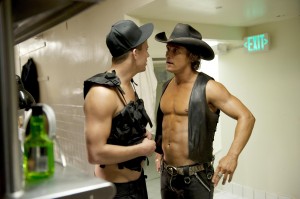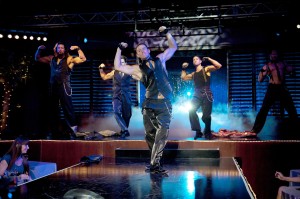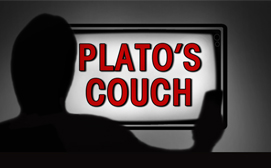
ANALYSIS: Reigning Men?: Masculinity in ‘Magic Mike’
You’re not just stripping. You are fulfilling every woman’s wildest fantasies. You are the husband that they never had. You are that dreamboat guy that never came along. You are the one-night stand: that free fling of a fuck that they get to have tonight, with you on stage, and still go home to their hubby and not get in trouble because you baby, you made it legal. You are the liberation!
– Dallas (Matthew McConaughey), Magic Mike
 Set in the world of male stripping, Magic Mike (d. Steven Soderbergh) is a film overtly concerned with fantasies – just not the ones you’d expect. Contrary to the trailers marketing the film as a frivolous flesh-fest for a whooping female audience or the seductive pitch offered by one of the film’s characters (above), Magic Mike has very little to say about ‘every woman’s wildest fantasies’. But as a film about the state of contemporary masculinity and the construction of gender, Magic Mike speaks volumes.
Set in the world of male stripping, Magic Mike (d. Steven Soderbergh) is a film overtly concerned with fantasies – just not the ones you’d expect. Contrary to the trailers marketing the film as a frivolous flesh-fest for a whooping female audience or the seductive pitch offered by one of the film’s characters (above), Magic Mike has very little to say about ‘every woman’s wildest fantasies’. But as a film about the state of contemporary masculinity and the construction of gender, Magic Mike speaks volumes.
Given the film’s central preoccupation with stripping, the displays of the body form a key element of Magic Mike’s gender representations. Recalling both Richard Dyer’s writing on the male pin-up and Yvonne Tasker’s analysis of bodybuilder-turned-action-heroes, the spectacle of male bodies in Magic Mike is marked by a series of contradictions and anxieties related to the cinematic gaze. Tasker suggests that such uncertainties are related
to the problematic processes through which male power is maintained in western culture, processes that involve the disavowal of the very fact that the man is being looked at, and the use of an insistent imagery which stresses hardness, partly through muscularity, a quality traditionally associated with masculinity. (1993:77)
This contradictory look is evident throughout Magic Mike; however, it would be misleading to suggest the film objectifies the male body in a way that significantly weakens the power commonly attributed to masculinity. While the backstage scenes involving glittery costumes, g-strings, spray tanning and even a penis pump reveal a potentially feminising obsession with appearances, the on-stage performances unequivocally reassert a form of dominant masculine identity.
Unlike the typical screen representations of female strippers rotating on poles as passive objects, the men in Magic Mike dominate both the stage and crowd, cavorting with audience members at will.  Despite the evident gaze of female spectators, these phallicised performers maintain an active agency that belies any implicit suggestion of them as passive sex objects.
Despite the evident gaze of female spectators, these phallicised performers maintain an active agency that belies any implicit suggestion of them as passive sex objects.
And yet, while the film maintains traditional gender relations in respect of the gaze (male/active and female/passive), Magic Mike is by no means an unadulterated celebration of male power. By framing the performance of masculinity in the strip shows within an economic context, the film works to challenge certain myths of male authority. Significantly, neither of the lead characters are particularly successful in their chosen career paths. The Kid (Alex Pettyfer) is an unskilled college football dropout, while Magic Mike (Channing Tatum), works multiple jobs only to be refused a bank loan to open his own business. In both cases, male stripping is presented as the only feasible form of employment in the current global financial climate.
The irony for Mike (and for masculinity) is that while each of his jobs outside of stripping (including construction, car detailing and furniture design) involve a form of production, it is only on stage as an object for consumption, dressed up as a construction worker or in various other fantasy guises, that he is rewarded or validated. Magic Mike thus presents a form of commodified masculinity in which the male body (in its aesthetic rather than functional regard) has become the only viable object of exchange in the specular currency of contemporary capitalism.
Predicated on now seemingly redundant forms of masculine authority, the only gender identities that hold any substantiative value in Magic Mike are those fantasy constructions performed on stage. Contemporary masculinity is reduced to a series of desperately energised strip routines costumed and choreographed from the remnants of its former selves. Reiterating Barbara Creed’s long-ago made observation of Schwarzenegger and Stallone as ‘performing the masculine’, Magic Mike thus makes of its men ‘simulacra of an exaggerated masculinity, the original completely lost to sight’ (1987:65).
 By revealing masculinity in its guise as a commodified fantasy, Magic Mike offers up a critique of traditional representations of gender (specifically the male body) outside of the usual active/passive framework of the gaze, while at the same time highlighting the seductiveness and marketability of those fantasies. It’s almost fitting in that regard that much of Magic Mike’s pre-publicity reduced the film to a tale of playful stripping and benign romance. This, after all, is the fantasy that sells. But hopefully some of the audience got less than they paid for.
By revealing masculinity in its guise as a commodified fantasy, Magic Mike offers up a critique of traditional representations of gender (specifically the male body) outside of the usual active/passive framework of the gaze, while at the same time highlighting the seductiveness and marketability of those fantasies. It’s almost fitting in that regard that much of Magic Mike’s pre-publicity reduced the film to a tale of playful stripping and benign romance. This, after all, is the fantasy that sells. But hopefully some of the audience got less than they paid for.
References:
Creed, Barbara, 1987. From Here to Modernity: Feminism and Postmodernism’, Screen 28(2): 47-67
Tasker, Yvonne, 1993. Spectacular Bodies: Gender, Genre and the Action Cinema, Routledge, New York
*This piece originally appeared in the on-line journal Kill Your Darlings and is republished with their kind permission.





RSS feed for comments on this post. TrackBack URI